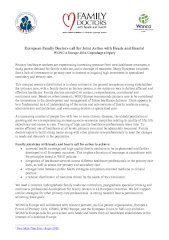
WONCA Europe 2016 Copenhagen: European Family Doctors call for Joint Action with Heads and Hearts!
Primary healthcare workers are experiencing increasing pressure from new healthcare structures, a rising patient demand for family medicine, and a shortage of resources. Many European countries face a lack of investment in primary care in contrast to ongoing high investment in specialised secondary and tertiary care.
This unequal resource distribution is in sharp contrast to the general acceptance among stakeholders that primary care, with a family doctor as the key person, is the optimum way to deliver efficient and effective healthcare. Family doctors provide first contact, comprehensive, co-ordinated and continuous care. Based on robust research, WHO Europe recommends that primary care be considered the cornerstone to the development and management of future healthcare delivery. There appears to be a fundamental lack of understanding of the nature and core services of family medicine among administrators and politicians, and even among doctors in specialized care.
An increasing number of people live with two or more chronic diseases, the elderly population is growing and we are experiencing increasing socio-economic inequities relating to quality of life, life expectancy and access to care. Training of high quality healthcare professionals takes time. To secure efficient use of healthcare at all levels, primary care must be adequately resourced. Family doctors aspire to build strong teams along with other primary care professionals to meet the changes in needs and demands in the population.
Family physician with heads and hearts call for action to achieve:
-
universal health coverage and high quality family medicine to be implemented and further developed in all European countries. This implies allocation of resources in accordance with the principles stated in WHO policies( foot note: Now More Than Ever Report 2008 ?)
-
integration of health care services across different healthcare professionals at theprimary care level, as well as across the primary and secondary care.
-
stronger links between public health strategies and person-oriented medicine in clinical practice.
-
And a rational distribution of resources driven by the needs of the community.
We need a common undergraduate family medicine curriculum, postgraduate specialist training and continuous professional development for family doctors in all European countries. We will support similar strategies for other primary care professionals. A strong research base is paramount to achieving these goals.
WONCA Europe will collaborate with relevant partners, such as patient organisations, European Forum of Primary Care, UEMO, WHO Europe, and the European Union to fulfil our ambition.
WONCA Europe calls for joint action with heads and hearts from all healthcare stakeholders in the interests of a healthier Europe.
- Access
- Public
- Year
- 2016
